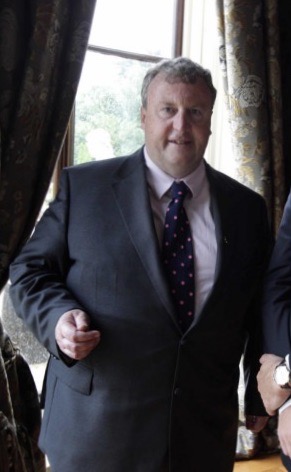THE outgoing chief executive of Horse Racing Ireland, Brian Kavanagh, is understood to be the frontrunner for the position of the new chief of the Curragh Racecourse Mr Kavanagh’s appointment to the top post at the Curragh – if confirmed – would come after years of governance concerns relating to his controversial 20-year tenure at Horse Racing Ireland (HRI) which received €67.2m in taxpayer funding in 2019.
The recruitment process for the Curragh post closed to applicants on March 29, just days after HRI launched a recruitment campaign to find a replacement for Mr Kavanagh on March 26.
Both campaigns were overseen by leading professional services firm Mazars.
In his role as HRI chief, Mr Kavanagh is also on the board of the Curragh Racecourse and oversaw the allocation of tens of millions of public funds – via HRI – towards the redevelopment of the facility.
HRI funded 49% of the new Curragh development to the tune of €36m to the end of 2019, and as a result posted an overall loss of more than €2m that year – something noted by the Comptroller and Auditor General at a recent Public Accounts Committee (PAC) session.
In return the semi-state HRI received a 35% share of the Curragh, which is also owned by the Turf Club and private individuals. Private investors include John Magnier’s Coolmore Stud, Moyglare Stud, the Aga Khan, Sheikh Mohammed’s Godolphin operation and JP McManus, who each contributed €5m.
Later contributors include Sheikh Hamdan’s Derrinstown Stud, Juddmonte Farms and Paddy Power co-founder David Power.
Under Government rules no CEO of any commercial semi-state body, is supposed to remain in situ for more than one seven-year term.
But Mr Kavanagh, who is an accountant by trade, has been reappointed three times and has been CEO continuously since 2001.
His €191,000 salary is far above the €137,000-€164,000 limit set for semi-state CEOs in 2011 but has remained at that level since Mr Kavanagh’s contract pre-dates the cost-saving measure.
Mr Kavanagh’s reappointments – despite Government rules to the contrary – has been the focus of much previous political criticism.
In 2016 the Oireachtas Agriculture Committee called for explanations from HRI board members after then-agriculture minister Michael Creed and then-public expenditure minister Paschal Donohoe sanctioned ‘on an exceptional basis’
Mr Kavanagh’s third appointment.
During the hearing, then-HRI chairman Joe Keeling apologised for the board’s ‘mishandling’ of the appointment process. ‘There have been errors – but no wrongdoing. There was no attempt to mislead the minister and the Government,’ he said.
Despite the apology, Mr Keeling candidly went on to admit to the committee that the semi-state’s entire succession plan amounted to Brian Kavanagh and nothing else.
‘The succession plan was Brian Kavanagh,’ he told the committee.
‘With regard to the fact that the role was not advertised, I took the view that Mr Kavanagh had competed twice and won easily. I believed it was a waste of money to have him compete a third time because he still would have won.’
Committee members were shocked at this approach from HRI. ‘There is a reason the guidelines are in place and State bodies are governed in this way,’ then-Independents 4 Change TD Clare Daly told the committee.
‘Nobody should be in that position. The only organisations in which it happens are in dictatorships such as North Korea. I think the only other one is the Olympic Council of Ireland.’
Since his initial appointment in 2001, Mr Kavanagh and HRI have engaged in protracted contractual disputes that remain unresolved.
The central dispute centres around his entitlement to a contract of indefinite duration – something not supposed to be afforded to semi-state chiefs.
But the Agriculture Committee heard that other unresolved issues included a stipulation that Mr
Kavanagh would not be employed in any HRI role once his second term concluded in 2016.
Nevertheless, he was appointed a third time and is now expected to land the top job at the Curragh where CEO Pat Keogh has been in situ since August 2019.
Mr Kavanagh did not respond to calls and messages this weekend.
But the controversy surrounding his appointments and salary continue to rankle with Oireachtas members. As recently as February this year these issues were once again raised at the PAC as it considers HRI’s 2019 finances.
This weekend the MoS asked HRI what Mr Kavanagh’s pension entitlement from HRI will be and whether any compensation will be paid in lieu of his departure two years prior to pension age as he previously requested.
We also asked HRI to explain how the appointment of Mr Kavanagh to the Curragh – a significantly
HRI-funded entity – would be in the spirit of prior stipulations that he not be awarded another HRI job.
In a written statement to the MoS, HRI confirmed: ‘Brian Kavanagh will be departing the organisation… without any compensation or payments of any nature.’
HRI said the salary for the Curragh CEO ‘is a matter for Curragh Racecourse Limited and their candidate’, and added that they ‘cannot comment on any individual pension arrangements which are between the individual and the trustees of the pension scheme’.
In relation to the recruitment process for the Curragh CEO role, HRI said: ‘The Curragh Racecourse ran an open recruitment process, advertising in print and digital media. The format of the recruitment process was a matter for the board of the Curragh.’
The Curragh Racecourse did not respond to requests for comment.




